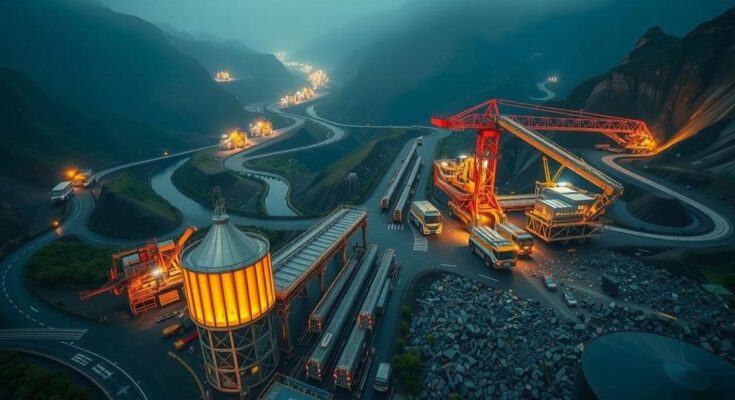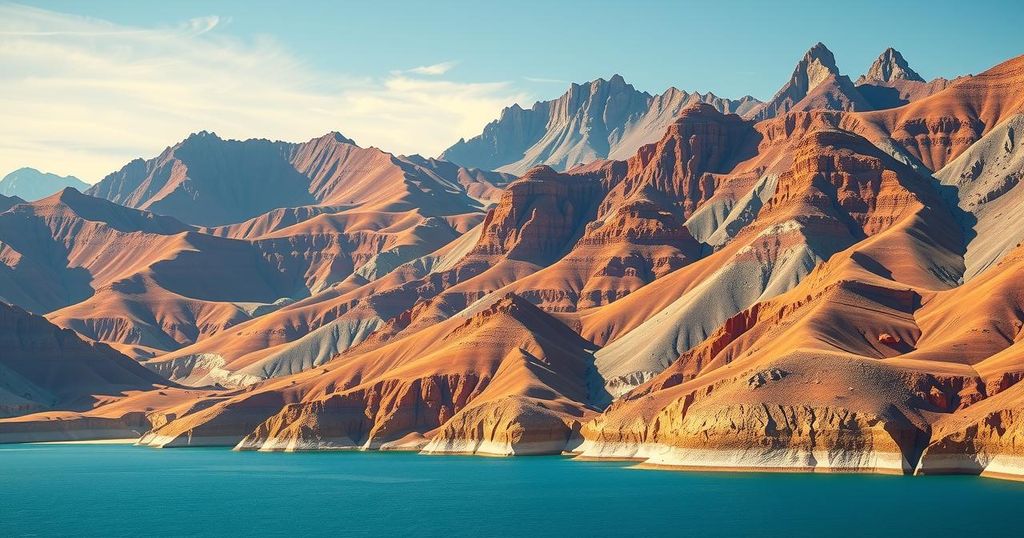Eastern DR Congo faces significant issues with illegal gold mining primarily conducted by Chinese firms, leading to environmental degradation and exploitation of local communities. Italian priest Davide Marcheselli highlights the impact on Kitutu’s environment. Despite attempts by authorities to regulate the sector, including a temporary ban, many firms continue to operate outside the law, complicating monitoring and enforcement efforts. The Congolese government is struggling to manage and profit from its gold resources amidst rising black market activity.
Eastern Democratic Republic of Congo is witnessing significant challenges related to illegal gold mining activities carried out by numerous foreign companies, predominantly from China. This situation has been notably troubling for local communities, particularly in Kitutu, where Italian priest Davide Marcheselli has been an outspoken critic. He asserts that the unregulated mining operations have resulted in severe environmental degradation, including the pollution of local rivers and destruction of agricultural land. According to local authorities, hundreds of Chinese-owned mining firms are operating illegally in the mineral-rich South Kivu province, often without permits and without reporting their profits. Civil society groups and religious leaders have been significantly involved in opposing these operations, despite the mining firms having connections to influential political figures. “From the deputies, to the village chief, everyone receives something (from the companies), money or shares (in businesses),” Marcheselli highlighted. The provincial governor, Jean-Jacques Purusi, has recently taken a stand by suspending illegal mining activities temporarily, pending compliance with Congolese mining regulations. These regulations require companies to update long-expired mining permits. In response to this ban, a staggering increase in firms seeking authorization to resume operations was observed, with Purusi stating that 540 companies sought approval instead of the anticipated 117. In Kamituga, approximately 40 kilometers from Kitutu, artisanal mining continues unabated, where local cooperatives struggle against the more equipped and financed Chinese firms. Artisanal mining, characterized by small-scale operations without heavy machinery, is legally restricted to Congolese nationals, yet many Chinese companies circumvent this by partnering with local cooperatives. Reports indicate that around half of the cooperatives in South Kivu have established partnerships with Chinese entities, complicating enforcement of local mining laws. The oversight of these operations has proven difficult, with local inspectors facing challenges in monitoring compliance and production. Despite the Congolese government’s attempts to regulate gold exports by granting a monopoly to state-owned Primera Gold, which aims to undermine illegal routes to Rwanda, substantial black market trafficking remains. Furthermore, the government has observed a dramatic rise in gold exports from South Kivu, surging from 42 kilograms (92 pounds) in 2022 to over five tonnes (11,200 pounds) in 2023, representing approximately one-sixth of the nationally declared production. Nevertheless, Primera Gold has encountered liquidity issues in purchasing the gold, contributing to the ongoing illegal trade that remains largely unmonitored, even by local authorities. Public officials have expressed frustrations over the challenges of obtaining accountability from these mining operations, highlighting a systemic problem in governing the mining sector in the region.
The Democratic Republic of Congo (DRC) is rich in natural resources, especially gold, leading to extensive foreign interest in its mining sector, particularly from Chinese firms. However, this has resulted in numerous illegal operations, raising concerns over environmental damage and exploitation of local communities. The local response has been insufficient due to the connections these firms have to political elites, and many civil society groups are left to combat these powerful interests alone. Recent government efforts to regulate and monitor these activities are met with significant resistance and challenges.
In summary, the ongoing struggle in Eastern DRC’s gold mining sector illuminates the complex interplay between local communities seeking to protect their environment and the powerful foreign entities exploiting resources without regard for law or ethics. Efforts to impose regulations face substantial obstacles, from entrenched illicit practices to the influence of high-ranking officials, suggesting that effective governance and accountability in the mining industry remain critical yet elusive goals.
Original Source: www.rfi.fr




